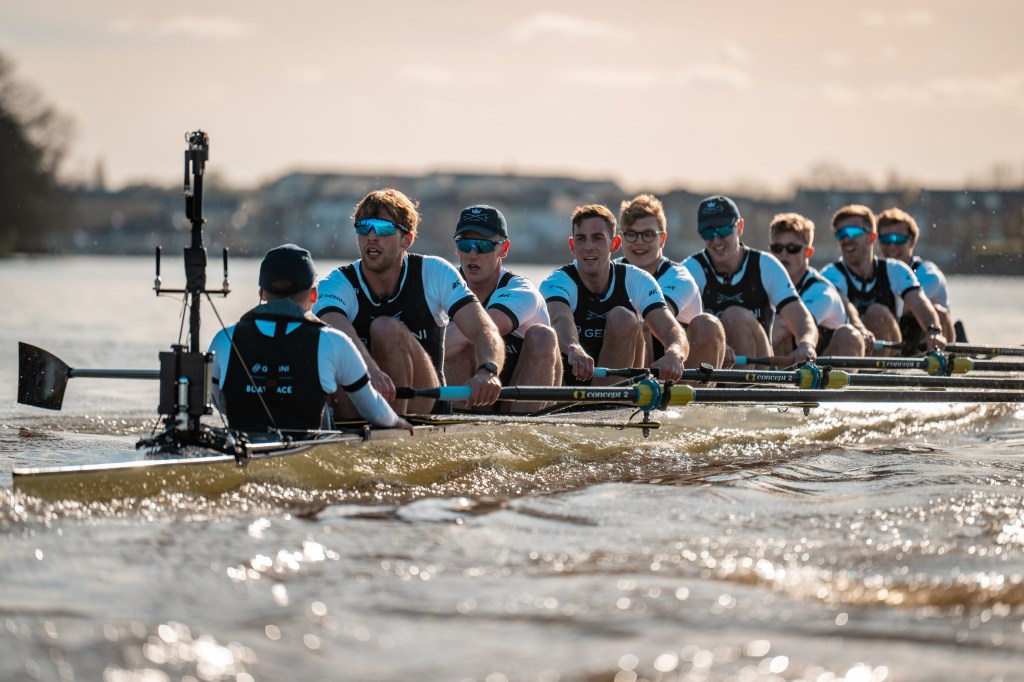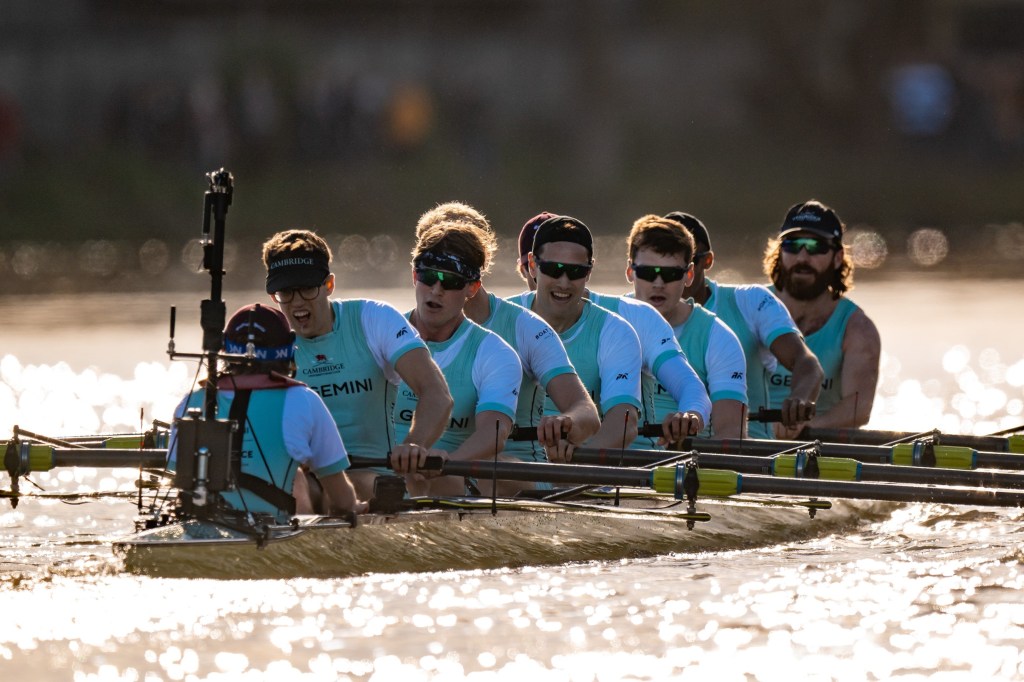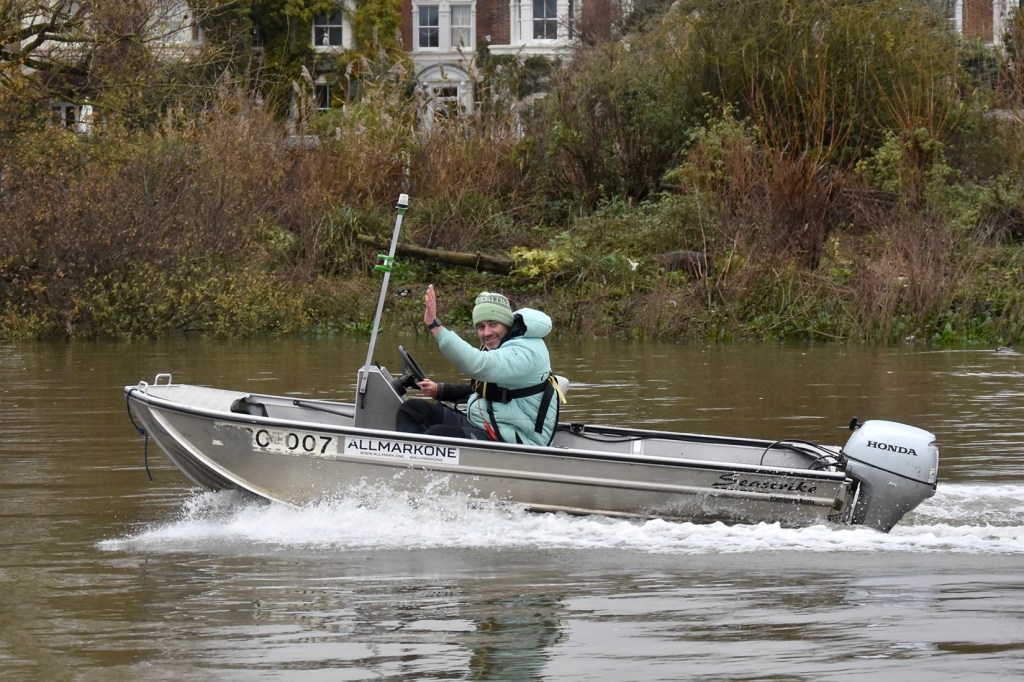
8 April 2024
By Chris Dodd
Chris Dodd, veteran rowing journalist and author, views the 2024 Boat Race.
As last year when Cambridge swept the Boat Race board, I took to my couch again while wondering how Oxford’s men and women will respond to their humiliation in 2023. Many times in the past, the famous Putney to Mortlake fixture has released something new just as you imagine that there is nothing more it can throw up after 150 years of sinkings, a dead heat, a loony swimmer, ‘record’ times, tactics on the final bend, knitting blades…
As the start time of the women’s race approached, Clare Balding was coxing television commentators and speculators on the box, and Martin Cross and Andrew Cotter dared to guess how the race would pan out as Putney Reach was roughing up after the millpond conditions of a sunny morning.

Cross forecast that the middle of the race would be critical in deciding the men’s result. Cotter crouched under Fulham FC’s massive new stand to explain how to take advantage of the bend there on the Middlesex station (north bank) or the south, Surrey side. Cross dwelt on a crew’s momentum where relaxation meets intensity. Cotter suggested that tricky water conditions would help whoever manages the bends best.
Oxford won both tosses and chose different stations – Middlesex for the women and Surrey for the men. Joe Gellett who was steering Oxford’s women came off badly as they passed Craven Cottage, Fulham FC’s field (‘craven’ means cowardly, contemptibly timid or pusillanimous, says my dictionary) as the Light Blues led the way past the Mile Post towards Hammersmith. The Dark Blues passed St Paul’s School, passed the blue window that was once the artist Julian Trevelyan’s studio and marks half way, along Chiswick Eyot, but still trailed.
Twelve minutes into the race Gellett made his hell-raising razor move. As umpire Richard Phelps was warning Cambridge who were boring close to Oxford’s water, Joe steered toward them and chased their tail for a bump. Phelps screamed ‘Oxford, I’m warning you! Oxford!’ And he warned the Dark Blues.

Cambridge stayed ahead and took their seventh consecutive women’s win. Joe raised his arm and a lengthy discussion with umpire Phelps took place. Joe argued that Cambridge had not returned to their station when warned. ‘Unfortunately’, Joe told the BBC later, ‘Richard concluded it didn’t happen in our water, so the result stands.’
It was a close-run thing. I had the impression that Phelps looked for reassurance from Boris Rankov, chairman of the Boat Race umpires board who was on his launch, more than once. Phelps reiterated his interpretation of where the centre of the tide is, an interpretation that is his prerogative on the day. Coxes and umpires are encouraged to get to know each other’s view of the navigation during the weeks before the race. As Joe made his case, it was evident that his breath was wasted. Perhaps he was steering close to an umpire’s suspicion that he deliberately aimed at Cambridge’s backside, or at least into Light Blue water.

The men’s race soon developed into commentator Cross’s sought-after balance between intensity and the relaxation built of rhythm. Sir Matt Pinsent was umpire and had to reach for his flag to warn Oxford’s Denegri after four minutes and Cambridge’s Bracey soon after. There was a minor clash of blades, and the crews continued to swarm at each other for a short while.
Cambridge, on Middlesex, gained half a length on the favourites who thought their Surrey station best to gain an early advantage and were mystified as to why they were trailing. Oxford matched Cambridge’s speed right past the craven place – where a large crowd sampled cocktails on the terrace of the new craven stand, formerly named after Eric Miller, for the first time. By the way, Craven’s application to build a pier out into the river and hazard rowers and other users seems to have gone quiet. Let’s hope so.

Pinsent warned the leading Light Blues at least half a dozen times and Dark Blues once before the crews reached Hammersmith Bridge where Light Blues led by about six seats and were able to minimise their opponent’s Surrey bend advantage.
Cambridge’s dynamism gave them one length at Trevelyan’s window, two lengths at Chiswick Steps and three lengths at the Crossing, putting words into commentator Crossey’s mouth. ‘Rhythm takes the Light Blues away,’ he said.
But another element entered the 2024 Boat Race. As Cambridge swept through the centre span of Barnes Bridge with a healthy lead and a licence to go where they liked, Matt Edge suddenly slumped and reduced his bladework to dipping it with body limp and head hung. He was lifted out of the boat at the finish but was reported to be okay. So Cambridge won the 169th Boat Race by a distance that shrank to 3 ½ lengths in the closing stages in 18 minutes 56 seconds.

Edge was one of several oarsmen who missed some recent training outings with a stomach upset, while the days leading up to the race saw broadcasters and newspapers reporting high levels of pollution in the Thames and illustrating rumours that the dreaded e-coli infection was hanging around in the Putney to Mortlake tideway area with images of Blue crews splashing and clashing. The presence of e-coli was short on evidence but a convenient excuse to question the traditional practice of throwing winning coxes into the drink.
Edge himself was not phased by his experience if his former utterance on his chosen sport is anything to go by. ‘Nothing I’ve found can bring peace to a busy Cambridge life like rowing can,’ he said earlier this year.
Edge’s President, Sebastian Benzecry, commented on his stroke’s performance thus: ‘Credit to Matt to go that deep.’
Oxford’s Leonard Jenkins said of the Dark Blue performance: ‘I didn’t expect it to be such a difference. Neither did I expect so much poo in the water.’

The day was excellent, enhanced by a novel approach to winning at Cambridge, and two pieces of news with Boat Race connections.
Paddy Ryan, the Light Blues’ chief coach, introduced what the Blue and Olympian Cath Bishop suggested sounded like ‘an absurd paradox, a sporting oxymoron, a human impossibility’. This season Ryan set his athletes a goal of care as the guiding principle of everything they do. He nurtured confidence and courage every day. There was no heroic psyching up for the pain of racing, no ‘win at any cost’ in Ryan’s Saturday morning briefing, according to Bishop in Wednesday’s Guardian.
She opined that Saturday’s race showed that a caring environment does not damage performance. Cambridge were not soft, but quite the opposite in psychological safety that discouraged the notion that performance must be difficult, even miserable. Ryan’s squad released themselves from outdated restraints, describing how coaches encouraged them to make mistakes and take risks without incurring recrimination. Selection was portrayed by coaches and senior athletes as rivalry in the sense of not lessening others while pushing forward with one another, building and cherishing friendships, giving each other courage and confidence.
Bishop quotes President Jenna Armstrong explaining that regardless of whether in front or behind, they were committed to their own best performance, ‘for the woman in front and the woman behind’.

Cambridge’s Culture of Care seems to have launched a new approach to teamwork, that essential ingredient in making the boat go faster (a quality described by the actors who learned to row to become The Boys in the Boat in George Clooney’s recent film of Daniel James Brown’s book). I suspect we shall hear more of these ideas based on the research of organisational psychologist Adam Grant.
The news with Boat Race connections involves the artist Annabel Eyres who created Rock the Boat and the photographer Eamonn McCabe.

Annabel painted watercolours of places she visited when rowing in the GB team, and she has been chosen as one of six artists to depict this year’s Olympics in Paris in the IOC’s attempt to reintroduce an arts festival to the Games.
McCabe, a brilliant shooter of sport and portraiture and an award-winning picture editor who died in 2022, is to be remembered by a bursary for young photographers in his name launched by the Guardian and the Observer, the newspapers where Eamonn spent most of his working life. Among his iconic pictures is his famous image of Cambridge sinking in the 1978 Boat Race.

An excellent report by Chris Dodd!
It’s very hard to assess the rights and wrongs of steering decisions solely from television coverage; it’s a very wide river and determining the centre line is a subtle piece of judgment at the best of times. However I think the Oxford women’s cox was quite justified in seeking to bump Cambridge, because Cambridge continued to be warned when Oxford aimed for them (implicitly confirming that they were still in Oxford’s water) until the very last moment, when the warnings were redirected at Oxford. In the end, this incident seemed very decisive in the outcome of the race, not so much because of the steering itself but more because Cambridge kept their composure much better than Oxford from that moment onwards.
I would love to see a proper break down of the application of the rules, esp to this year’s races. From my reading, Rules & Umpiring | The Boat Race, no contact = no foul. And secondly, what matters is what the umpire saw. If the coxes have a different view of what happened, then that’s relatively irrelevant?
So in the post race discussion, it looked to me as though Joe Gellett & Richard Phelps were talking at cross purposes? I’m not sure that RP had seen the contact that JG was referring to – contact before the big alteration of course?
Even better would be a discussion of the particular rules of the race before the start.